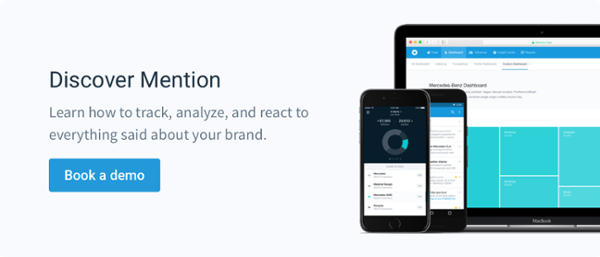If you struggle to generate good leads for your company, you’re not alone. Every brand – tiny to giant – needs ways to add more subscribers, prospects, and customers.
And chances are, what once worked flawlessly for you is now less effective. Your classic techniques are a little dated, and you’re running low on ideas. It feels like you’ve tried everything, asked everyone, searched everywhere.
But fear not! Businesses do find leads and customers online, and it doesn’t have to be a chore.
To prove this, we asked three Mention customers how they generate leads. These successful businesses use the web to their advantage, using our listening tools to find new buyers.
The three approaches – and the three companies – are different, so all kinds of businesses can learn from their stories.
Let’s see how they do it.
Find leads using competitive analysis
This is hands-down one of our favorite lead generation strategies using social listening. Competitive analysis has so many advantages. Study your competition to:
- Know what their customers say about them
- Compare their social content to your own
- Monitor their customer service strategy
- Learn about their new products as soon as they’re released
- Find influencers talking about them
But you came here to find leads, and we’re going to show you how to do it.
One World Direct
One World Direct is an order fulfillment company based in South Dakota. They help companies outsource distribution and call centers, especially for eCommerce. Basically, essential services that a lot of companies need.
Their customers are all over the world, and they need a wide range of services. This means that their potential customer base is…anyone that sells stuff. So they’ve become creative at generating leads.
Director of Business Development Gideon Oakes found a clever use for their Mention account. He created alerts to track some of their biggest competitors. But this wasn’t just to monitor these brands’ output; he wanted to see what customers said about their services.
“One of our competitors was going through a really tough time in quarter 4 of 2015. They were having a hard time delivering on their services. So we were able to tap in, even before they were able to delete the negative feedback they were getting on Facebook, Twitter, forums, and so forth.”
From there, the strategy was simple. “We were able to reach out to their clients and say ‘hey, I see you’re having problems here. We do this too, by the way, in case you’re interested in switching.’”
This is one of their favorite lead generation tactics. “We’ve signed some very good clients who legitimately had big gripes and they didn’t really know about us. So bringing that awareness to them just really helped out.”
One World Direct signs clients to large accounts, often internationally. Just one sale can mean significant revenue. So for Gideon, Mention pays for itself.
“[Mention is] so affordable that any traffic and any revenue that we bring in is going to pay for it.”
Read the full success story here.
The strategy (in a nutshell)
If you want the same results as One World Direct, it only takes a few steps:
- Monitor your competitors on social media
- Listen for customers unhappy with their service
- Identify how you can help those customers
- Reach out and explain your offer
Obviously, it’s vital that you act professional and not pushy. A poorly worded tweet can easily come across as creepy. Be respectful, and remember that you’re there to help first, and sell second.
But done well, this strategy is proven to work. We’ve already written about how Close.io brought in $585 a month with one tweet, and One World Direct has seen excellent results.
Find leads on social media
We just saw how laser-focused social listening can help you generate leads from your competitors. But a broader listening strategy can also be beneficial. After all, you care about more than just what your competitors are up to.
Monitor keywords that relate to your industry. This lets you:
- Stay up with industry trends
- See what potential buyers talk about
- Find influential social users discussing your industry
- Follow the news as it happens
- Find common problems or complaints within your industry
Casting a wide net also helps you find people looking for services like yours. Social media users commonly ask for recommendations from their peers, and you can take advantage of this.
Let’s take a look at one company doing exactly that.
Host1Plus
Host1Plus is a web hosting provider with 45,000+ clients around the world. With data centers in North & South America, Europe and Africa, they provide stable networks and great customer care.
Viktorija Poderskienė says they use listening as part of their social sales strategy:
“We monitor certain keywords looking for people interested in web hosting services. Not only are we trying to gain insights, but we’re also keen to help people. Our sales team offers assistance to solve certain problems, and suggest custom proposals.”
This listening technique is part of a strong social sales strategy. Since people live in social media, that’s where you need to reach them. More and more companies are employing this strategy, just like Host1Plus.
But Host1Plus doesn’t rush to sell on social media; they’re there to give advice and be a resource. “We’re happy to know that we attract new customers by helping them, as we believe that this is the only way the relationship with a customer should begin.”
An added benefit of this approach is that satisfied social users quickly turn into brand advocates. It’s simple: if you can help someone, they’re more likely to recommend you to others. Host1Plus also monitors social media for people saying nice things about them, then reaches out to keep the good vibes flowing:
“With Mention, we can reach out to our brand ambassadors to express our gratitude, share our in-house news and take their feedback into account. All that effort results in better online engagement, wider reach and, eventually, an increase in sales.”
The strategy (in a nutshell)
So how can you use this strategy for your brand? Luckily, it’s pretty straightforward:
- Create alerts to monitor industry keywords (perhaps your key selling points)
- Watch for social users who need help
- Reach out and give them advice – without pushing
- Show them how you can solve their problems
- Encourage them to share their good experiences on social media
It’s not groundbreaking, but it can be incredibly effective.
Win deals by knowing more about your prospects
This lead generation strategy is best for agencies, service providers, and other companies targeting big contracts. If just one client makes a massive difference to your success, keep reading.
To increase your chances of landing that big deal, you need to study up on your target. If you’re investing serious prep time for a pitch meeting or proposal, it really pays to know who you’re talking to.
Use media monitoring to get to know your prospect better, and impress them with your knowledge on:
- Their customers
- Their competitors
- Their current business strategy
- Their industry overall
Be ready to prove to them how much they mean to you, and you’re in a better position to bring them on board.
Here’s an example from one of the world’s largest marketing agencies.
McCann San Jose
“Bad Romance” for National Geographic Network by McCann Worldgroup
McCann Worldgroup is one of the world’s largest marketing communications organizations. They help brands in 120 countries build awareness through marketing and advertising.
When courting new clients, McCann uses Mention to show them how social listening will improve their marketing efforts. They create specific alerts to monitor what’s said about prospects and then explain how McCann can address these issues.
Digital Integration Manager Andrea Fallas says “we give examples of how social listening can help brands develop insights to improve their strategies.” Not only are they better prepared for pitch meetings, but they can also tailor their proposals perfectly to each prospect.
“We ask them for a specific case so that we can demonstrate the deliverables that we will give them once we are hired. It’s one of our pitch tactics.”
Much of this work is automated thanks to Mention’s social listening tools. The result is a more detailed pitch process, without having to dedicate endless hours to client research.
“Mention has been very helpful for getting new clients into the business.”
Read the full case study here.
The strategy (in a nutshell)
Use media monitoring (social listening) to learn more about your prospects. Simply create an alert for their brand name and watch for:
- Users talking about their product online
- Reviews and critiques of their service
- Comparisons between them and their major competitors
- Responses to their earlier marketing campaigns
- Their own posts on social media and their blog
With this information, show your prospects how your service can improve their online presence using practical examples. Base your advice on facts and real interactions, and impress them by how well you know their business.
By coming to the table prepared, you give yourself the best chance of signing the clients you want.
Conclusion

We just saw three lead generation strategies from real Mention clients. Depending on your business, you may be able to use one, two, or all three to acquire customers of your own.
And the good news is that none of this is groundbreaking. These are smart marketers using simple social listening technology for great results.
You can do the same. You just need a good listening tool, a clear strategy, and a desire to get results. We can definitely help you with the first one, and we just gave you three clear strategies.
The rest is up to you.
Want to try this for yourself? Talk to us about using Mention for your business






